Bugasong | |
|---|---|
| Municipality of Bugasong | |
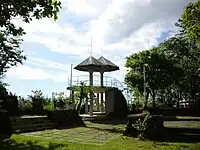 The historical Estaca Hill | |
 Flag | |
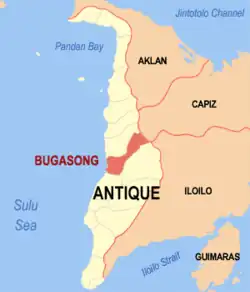 Map of Antique with Bugasong highlighted | |
OpenStreetMap | |
.svg.png.webp) Bugasong Location in the Philippines | |
| Coordinates: 11°02′41″N 122°03′53″E / 11.0447°N 122.0647°E | |
| Country | Philippines |
| Region | Western Visayas |
| Province | Antique |
| District | Lone district |
| Founded | 1591 |
| Barangays | 27 (see Barangays) |
| Government | |
| • Type | Sangguniang Bayan |
| • Mayor | John Lloyd M. Pacete |
| • Vice Mayor | Renante S. Dava |
| • Representative | Loren Legarda |
| • Municipal Council | Members |
| • Electorate | 22,422 voters (2022) |
| Area | |
| • Total | 203.71 km2 (78.65 sq mi) |
| Elevation | 296 m (971 ft) |
| Highest elevation (Mount Baloy) | 1,960 m (6,430 ft) |
| Lowest elevation | 0 m (0 ft) |
| Population (2020 census)[3] | |
| • Total | 34,676 |
| • Density | 170/km2 (440/sq mi) |
| • Households | 8,172 |
| Demonym | Bugasongnon |
| Economy | |
| • Income class | 3rd municipal income class |
| • Poverty incidence | 19.93 |
| • Revenue | ₱ 153.1 million (2020) |
| • Assets | ₱ 274.6 million (2020) |
| • Expenditure | ₱ 141.3 million (2020) |
| • Liabilities | ₱ 64.91 million (2020) |
| Service provider | |
| • Electricity | Antique Electric Cooperative (ANTECO) |
| Time zone | UTC+8 (PST) |
| ZIP code | 5704 |
| PSGC | |
| IDD : area code | +63 (0)36 |
| Native languages | Karay-a Hiligaynon Tagalog |
Bugasong, officially the Municipality of Bugasong (Kinaray-a: Banwa kang Bugasong; Hiligaynon: Banwa sang Bugasong; Tagalog: Bayan ng Bugasong), is a 3rd class municipality in the province of Antique, Philippines. According to the 2020 census, it has a population of 34,676 people.[3] Making it 8th most populous municipality in the province of Antique and fourth largest municipality in terms of land area, with a total area of 203.71 square kilometers.
Geography
Bugasong is 43 kilometres (27 mi) from the provincial capital, San Jose de Buenavista.
According to the Philippine Statistics Authority, the municipality has a land area of 203.71 square kilometres (78.65 sq mi) [5] constituting 7.46% of the 2,729.17-square-kilometre- (1,053.74 sq mi) total area of Antique. Bugasong has two largest river's Paliwan River 58.1 km (36.1 mi) and Kangaranan River 56.8 km (35.3 mi). Bugasong has many highest peaks Mount Baloy 1,958 m (6,424 ft) and Mount Balabag 1,716 m (5,630 ft).
Climate
| Climate data for Bugasong, Antique | |||||||||||||
|---|---|---|---|---|---|---|---|---|---|---|---|---|---|
| Month | Jan | Feb | Mar | Apr | May | Jun | Jul | Aug | Sep | Oct | Nov | Dec | Year |
| Mean daily maximum °C (°F) | 30 (86) |
31 (88) |
32 (90) |
33 (91) |
32 (90) |
30 (86) |
29 (84) |
29 (84) |
29 (84) |
29 (84) |
30 (86) |
30 (86) |
30 (87) |
| Mean daily minimum °C (°F) | 22 (72) |
22 (72) |
22 (72) |
24 (75) |
25 (77) |
25 (77) |
25 (77) |
25 (77) |
25 (77) |
24 (75) |
23 (73) |
22 (72) |
24 (75) |
| Average precipitation mm (inches) | 48 (1.9) |
41 (1.6) |
58 (2.3) |
82 (3.2) |
223 (8.8) |
300 (11.8) |
346 (13.6) |
307 (12.1) |
311 (12.2) |
292 (11.5) |
167 (6.6) |
81 (3.2) |
2,256 (88.8) |
| Average rainy days | 11.4 | 7.7 | 11.3 | 15.4 | 25.7 | 28.5 | 29.5 | 28.7 | 28.3 | 28.7 | 21.8 | 15.2 | 252.2 |
| Source: Meteoblue[6] (Use with caution: this is modeled/calculated data, not measured locally.) | |||||||||||||
Barangays
Bugasong is politically subdivided into 27 barangays.[7] Each barangay consists of puroks and some have sitios.
Ilaures and Cubay Sur were sitios converted into barrios in 1957 and 1959, respectively.[8][9]
| PSGC | Barangay | Population | ±% p.a. | |||
|---|---|---|---|---|---|---|
| 2020[3] | 2010[10] | |||||
| 060604001 | Anilawan | 0.6% | 223 | 213 | 0.46% | |
| 060604002 | Arangote | 1.5% | 510 | 442 | 1.44% | |
| 060604003 | Bagtason | 5.2% | 1,786 | 1,779 | 0.04% | |
| 060604004 | Camangahan | 3.3% | 1,139 | 1,124 | 0.13% | |
| 060604018 | Centro Ilawod (Poblacion) | 5.8% | 2,020 | 1,934 | 0.44% | |
| 060604019 | Centro Ilaya (Poblacion) | 6.3% | 2,190 | 2,086 | 0.49% | |
| 060604020 | Centro Pojo (Poblacion) | 6.5% | 2,259 | 2,147 | 0.51% | |
| 060604005 | Cubay North | 5.2% | 1,813 | 1,635 | 1.04% | |
| 060604006 | Cubay South | 3.8% | 1,330 | 1,272 | 0.45% | |
| 060604009 | Guija | 3.3% | 1,140 | 1,078 | 0.56% | |
| 060604010 | Igbalangao | 5.1% | 1,773 | 1,754 | 0.11% | |
| 060604011 | Igsoro | 3.9% | 1,368 | 1,261 | 0.82% | |
| 060604012 | Ilaures | 4.0% | 1,391 | 1,361 | 0.22% | |
| 060604013 | Jinalinan | 3.0% | 1,053 | 955 | 0.98% | |
| 060604014 | Lacayon | 3.8% | 1,307 | 1,148 | 1.31% | |
| 060604015 | Maray | 1.3% | 468 | 398 | 1.63% | |
| 060604016 | Paliwan | 3.8% | 1,303 | 1,227 | 0.60% | |
| 060604017 | Pangalcagan | 5.9% | 2,053 | 1,805 | 1.30% | |
| 060604021 | Sabang East | 2.4% | 835 | 783 | 0.64% | |
| 060604022 | Sabang West | 2.3% | 801 | 689 | 1.52% | |
| 060604023 | Tagudtud North | 3.2% | 1,102 | 1,771 | −4.63% | |
| 060604024 | Tagudtud South | 3.0% | 1,044 | 944 | 1.01% | |
| 060604025 | Talisay | 2.8% | 982 | 953 | 0.30% | |
| 060604026 | Tica | 1.6% | 540 | 521 | 0.36% | |
| 060604027 | Tono-an | 2.1% | 745 | 671 | 1.05% | |
| 060604028 | Yapu | 1.6% | 551 | 527 | 0.45% | |
| 060604029 | Zaragoza | 5.5% | 1,916 | 1,786 | 0.70% | |
| Total | 34,676 | 32,264 | 0.72% | |||
Demographics
| Year | Pop. | ±% p.a. |
|---|---|---|
| 1903 | 11,101 | — |
| 1918 | 10,924 | −0.11% |
| 1939 | 14,863 | +1.48% |
| 1948 | 15,642 | +0.57% |
| 1960 | 16,635 | +0.51% |
| 1970 | 17,697 | +0.62% |
| 1975 | 17,988 | +0.33% |
| 1980 | 21,619 | +3.74% |
| 1990 | 24,537 | +1.27% |
| 1995 | 26,721 | +1.61% |
| 2000 | 28,294 | +1.23% |
| 2007 | 30,394 | +0.99% |
| 2010 | 32,264 | +2.20% |
| 2015 | 33,642 | +0.80% |
| 2020 | 34,676 | +0.60% |
| Source: Philippine Statistics Authority[11][10][12][13] | ||
In the 2020 census, Bugasong had a population of 34,676.[3] The population density was 170 inhabitants per square kilometre (440/sq mi).
Bugasongnons speak Kinaray-a as their main dialect while Hiligaynon is used as their secondary dialect.
Economy
Government
The current mayor of the town is John Lloyd Pacete with Bernard Pesayco as vice mayor. The town council is composed of ten members, eight are elected at large, while two are elected after the barangay elections. The current town council members are:
- Casimira de la Cruz
- Aida Uy Kimpang
- Gerardo Antoy
- Susan Escote
- Geraldine Pesayco
- Roberto Fruto
- Cyril Pesayco
- Renante Dava
- Krizel Joy Panaguiton (SK Municipal Federation President)
- Norma Sayon (Liga ng mga Barangay)
Tourism
The town celebrates its annual town fiesta every 18 January in honor of Santo Niño (the Holy Child). The local town festival, the Bugas Sa Lusong, is integrated with this celebration, with its opening salvo sometime between 10 and 12 January. The highlight of the celebration is the high mass on 18 January, usually celebrated by the diocesan bishop and visiting priests.
The patadyong, a colorful native fabric, is a well-known product made by the locals in barangay Bagtason.
The Estaca Hills historically served as the town's watch tower. Currently, it is a destination for hiking. From the top, one can see the entirety of Bugasong.
Education
The town is the location of the only Dominican school in the province of Antique, Saint Joseph Academy, which was established on 1957. The school is run by the Dominican Sisters of the Most Holy Rosary of the Philippines. Notable alumni include former Deputy Ombudsman for the Visayas Atty. Pelagio Apostol and then National Artist Edsel Moscoso. Rex Francis Z. Ynion, a Council Scout Executive of the Boy Scouts of the Philippines, Metro Manila South Council which has jurisdiction to the Cities of Las Pinas, Taguig, Muntinlupa and Municipality of Pateros.
Other schools in the town include: Antique Vocational School, at the town proper; Northern Bugasong National School at barangay Cubay North; Southern Bugasong National School at barangay Igbalangao and Eastern Bugasong National High School (formerly Northern Bugasong National High School-Annex) at barangay Pangalcagan.
Gallery
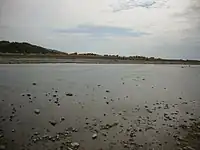 The summer heat in 2010 dried up the Cangaranan River
The summer heat in 2010 dried up the Cangaranan River A local fisherman in Bugasong is set to hurdle the waves
A local fisherman in Bugasong is set to hurdle the waves The historical Estaka hill
The historical Estaka hill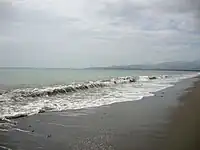 The shores of Ilaures
The shores of Ilaures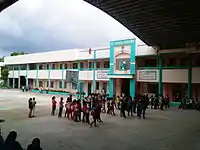 Saint Joseph Academy, the only Dominican school in Antique
Saint Joseph Academy, the only Dominican school in Antique Bugasong sea shores
Bugasong sea shores
References
- ↑ Municipality of Bugasong | (DILG)
- ↑ "2015 Census of Population, Report No. 3 – Population, Land Area, and Population Density" (PDF). Philippine Statistics Authority. Quezon City, Philippines. August 2016. ISSN 0117-1453. Archived (PDF) from the original on May 25, 2021. Retrieved July 16, 2021.
- 1 2 3 4 Census of Population (2020). "Region VI (Western Visayas)". Total Population by Province, City, Municipality and Barangay. Philippine Statistics Authority. Retrieved 8 July 2021.
- ↑ "PSA Releases the 2018 Municipal and City Level Poverty Estimates". Philippine Statistics Authority. 15 December 2021. Retrieved 22 January 2022.
- ↑ "Province: Antique". PSGC Interactive. Quezon City, Philippines: Philippine Statistics Authority. Retrieved 12 November 2016.
- ↑ "Bugasong: Average Temperatures and Rainfall". Meteoblue. Retrieved 1 May 2020.
- ↑ "Municipal: Bugasong". PSGC Interactive. Quezon City, Philippines: Philippine Statistics Authority. Retrieved 8 January 2016.
- ↑ "Republic Act No. 1743 - An Act Creating the Barrio of Ilaures in the Municipality of Bugasong, Province of Antique". Chan Robles Virtual Law Library. 21 June 1957. Archived from the original on 27 September 2013. Retrieved 30 October 2016.
- ↑ "Republic Act No. 2133; An Act Creating the Barrio of Cubay Sur in the Municipality of Bugasong, Province of Antique". The Corpus Juris. 7 April 1959. Archived from the original on 30 October 2016. Retrieved 30 October 2016.
- 1 2 Census of Population and Housing (2010). "Region VI (Western Visayas)" (PDF). Total Population by Province, City, Municipality and Barangay. National Statistics Office. Retrieved 29 June 2016.
- ↑ Census of Population (2015). "Region VI (Western Visayas)". Total Population by Province, City, Municipality and Barangay. Philippine Statistics Authority. Retrieved 20 June 2016.
- ↑ Censuses of Population (1903–2007). "Region VI (Western Visayas)". Table 1. Population Enumerated in Various Censuses by Province/Highly Urbanized City: 1903 to 2007. National Statistics Office.
{{cite encyclopedia}}: CS1 maint: numeric names: authors list (link) - ↑ "Province of Antique". Municipality Population Data. Local Water Utilities Administration Research Division. Retrieved 17 December 2016.
- ↑ "Poverty incidence (PI):". Philippine Statistics Authority. Retrieved December 28, 2020.
- ↑ "Estimation of Local Poverty in the Philippines" (PDF). Philippine Statistics Authority. 29 November 2005.
- ↑ "2003 City and Municipal Level Poverty Estimates" (PDF). Philippine Statistics Authority. 23 March 2009.
- ↑ "City and Municipal Level Poverty Estimates; 2006 and 2009" (PDF). Philippine Statistics Authority. 3 August 2012.
- ↑ "2012 Municipal and City Level Poverty Estimates" (PDF). Philippine Statistics Authority. 31 May 2016.
- ↑ "Municipal and City Level Small Area Poverty Estimates; 2009, 2012 and 2015". Philippine Statistics Authority. 10 July 2019.
- ↑ "PSA Releases the 2018 Municipal and City Level Poverty Estimates". Philippine Statistics Authority. 15 December 2021. Retrieved 22 January 2022.